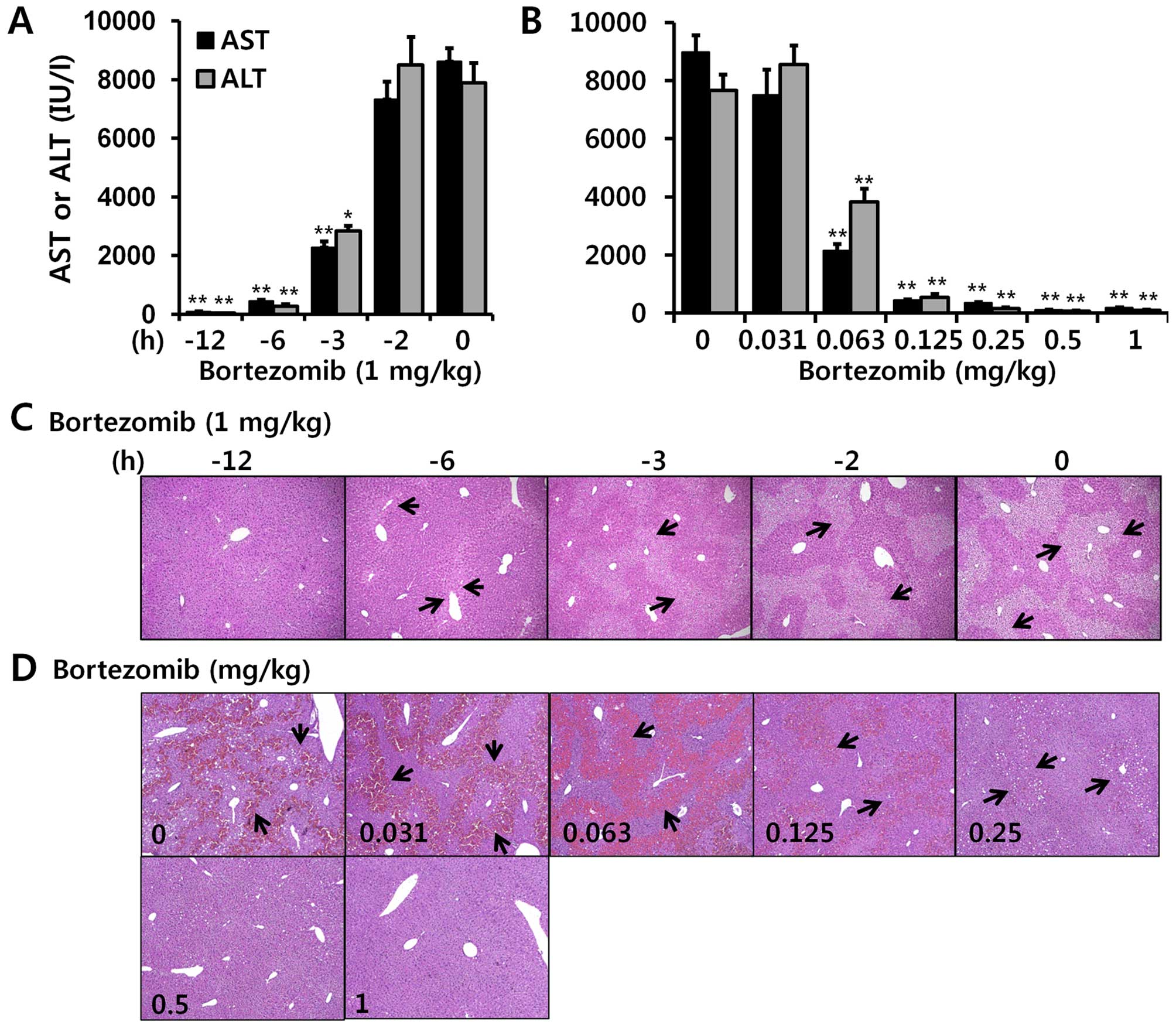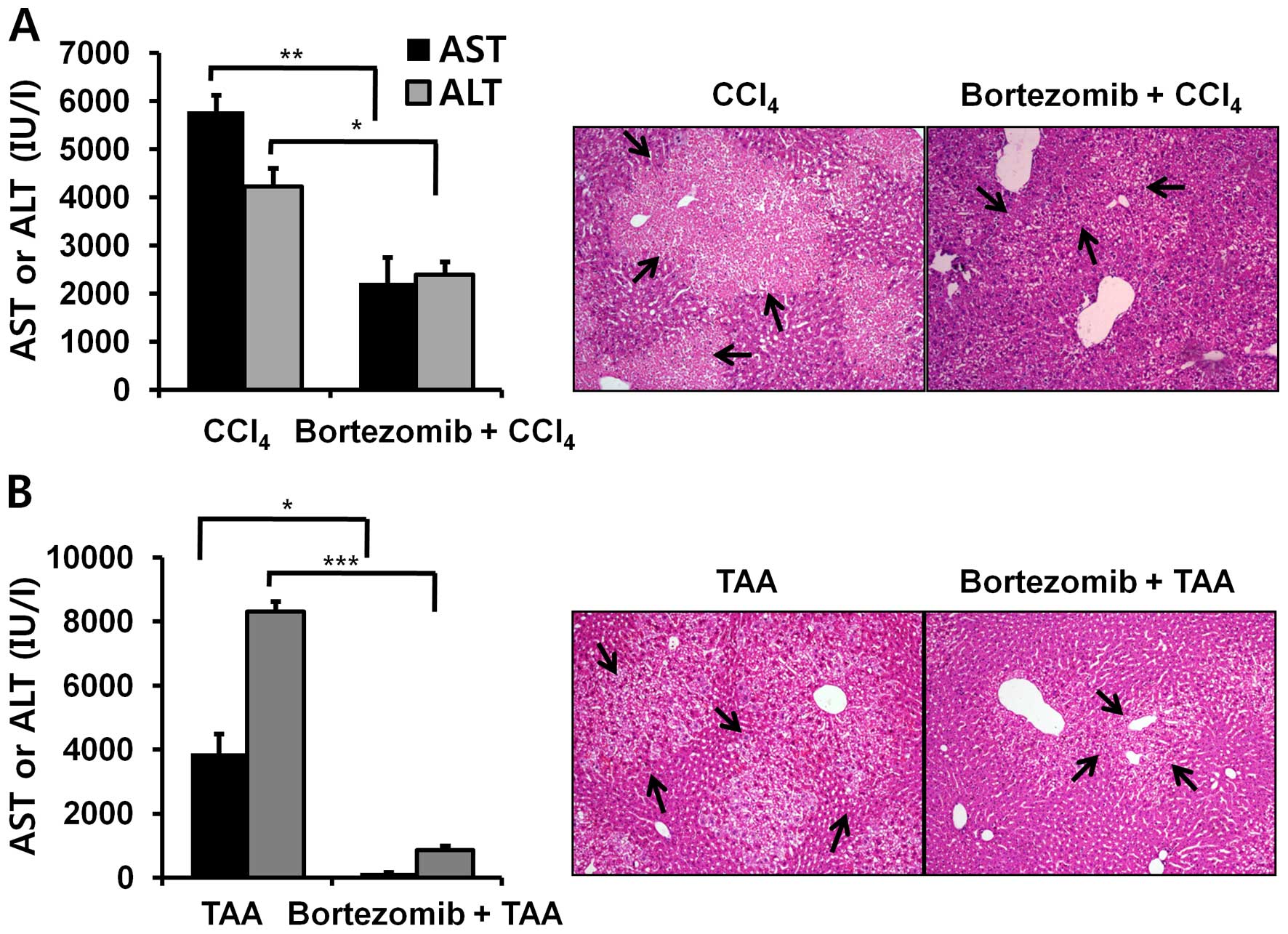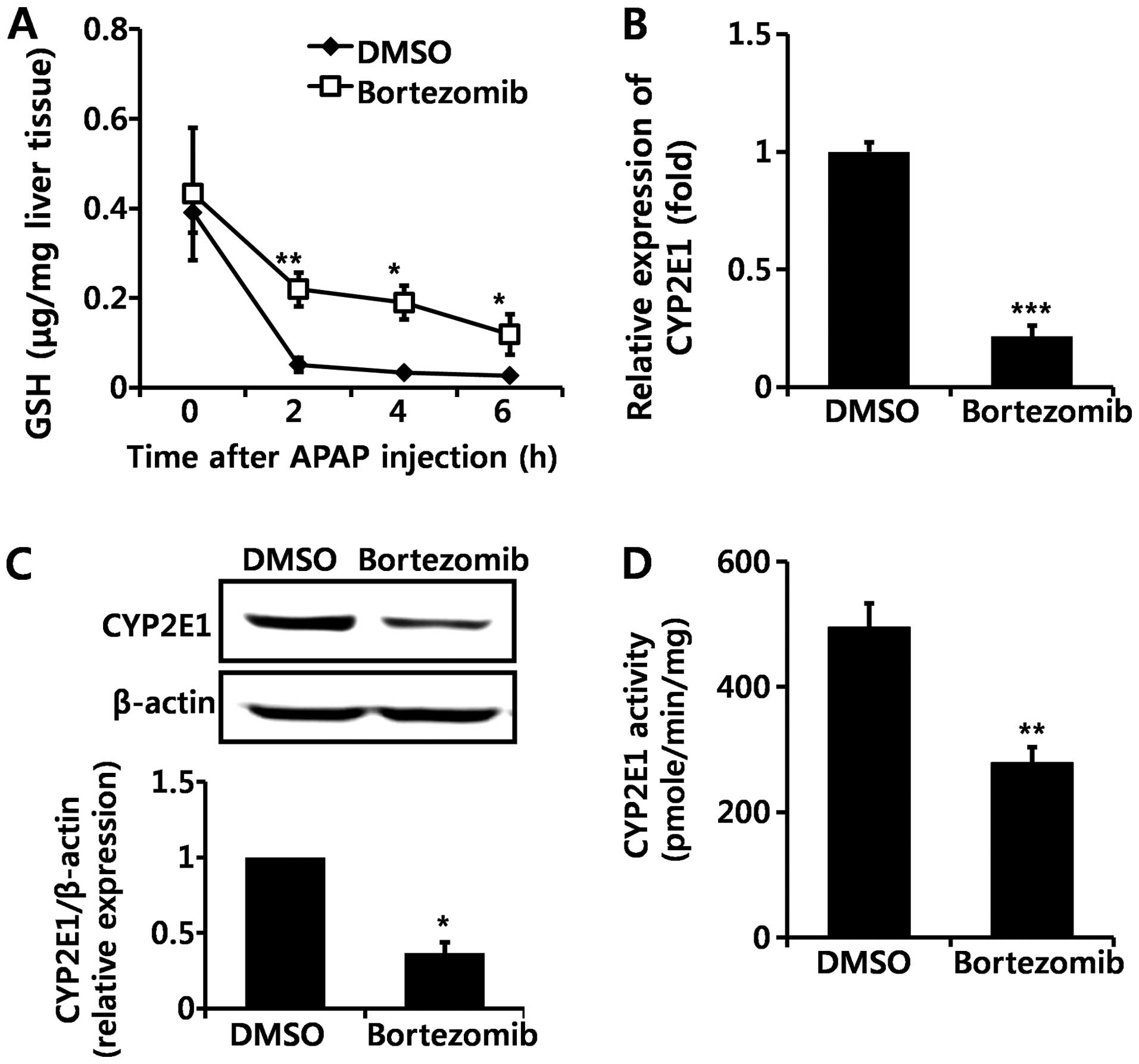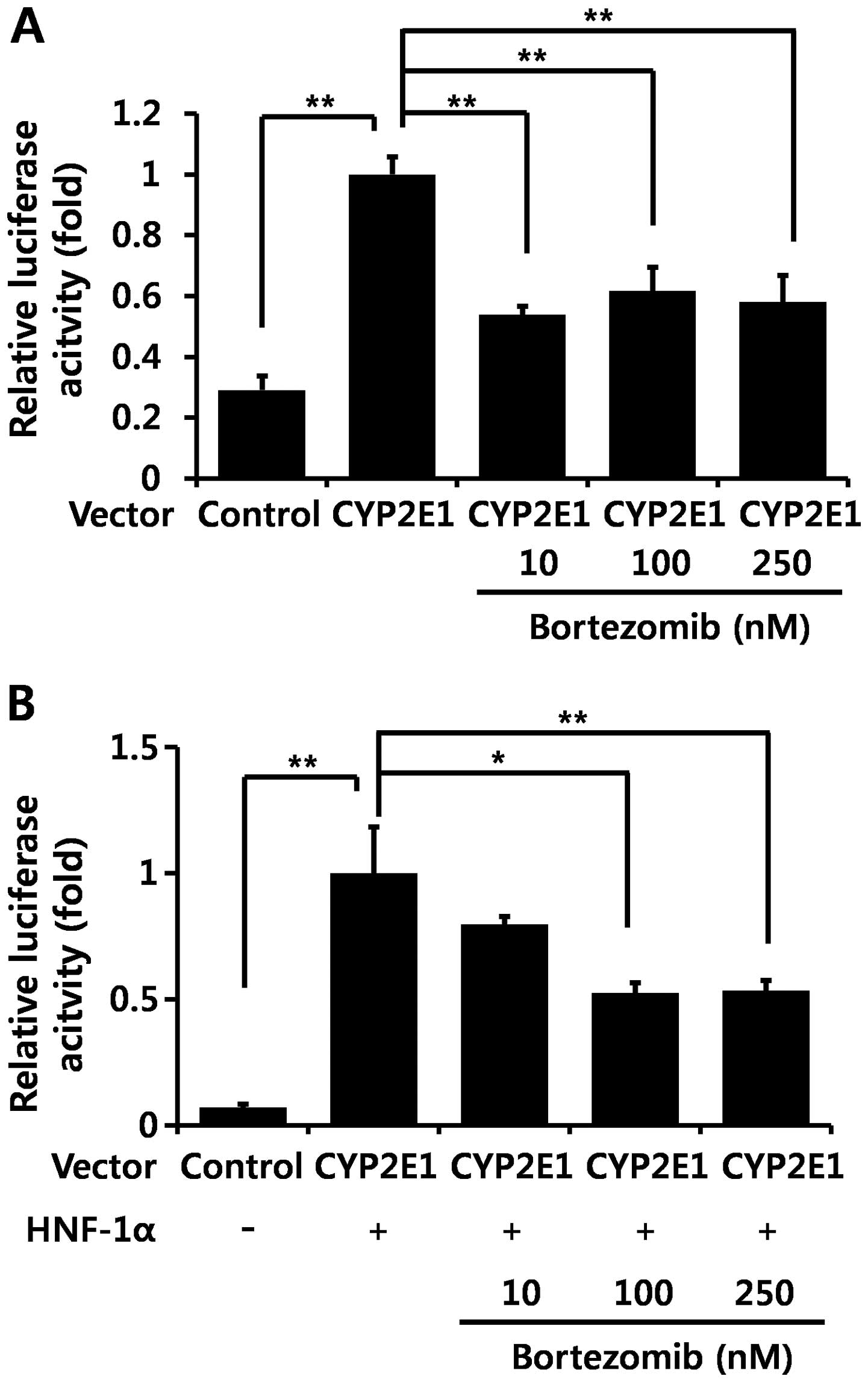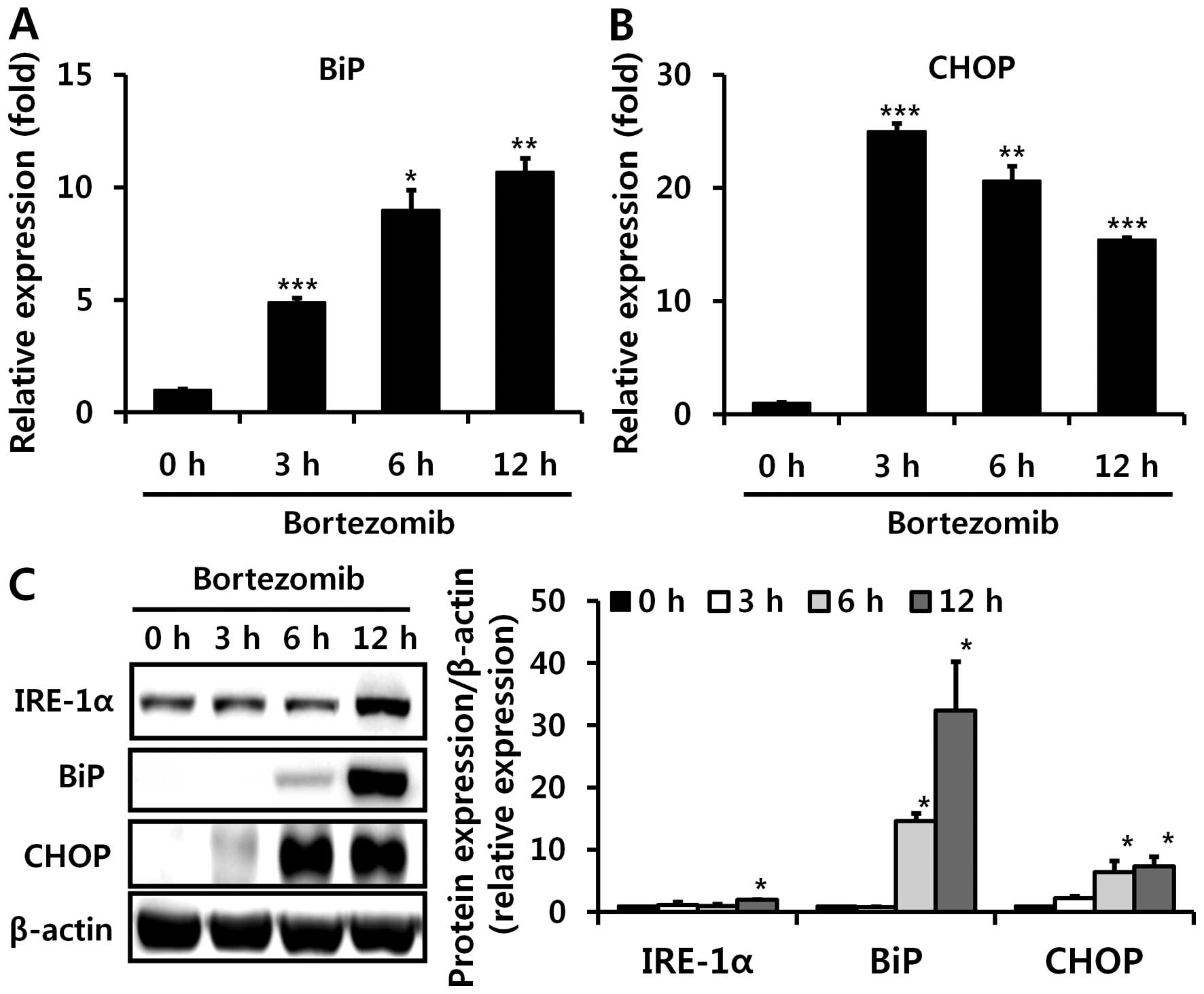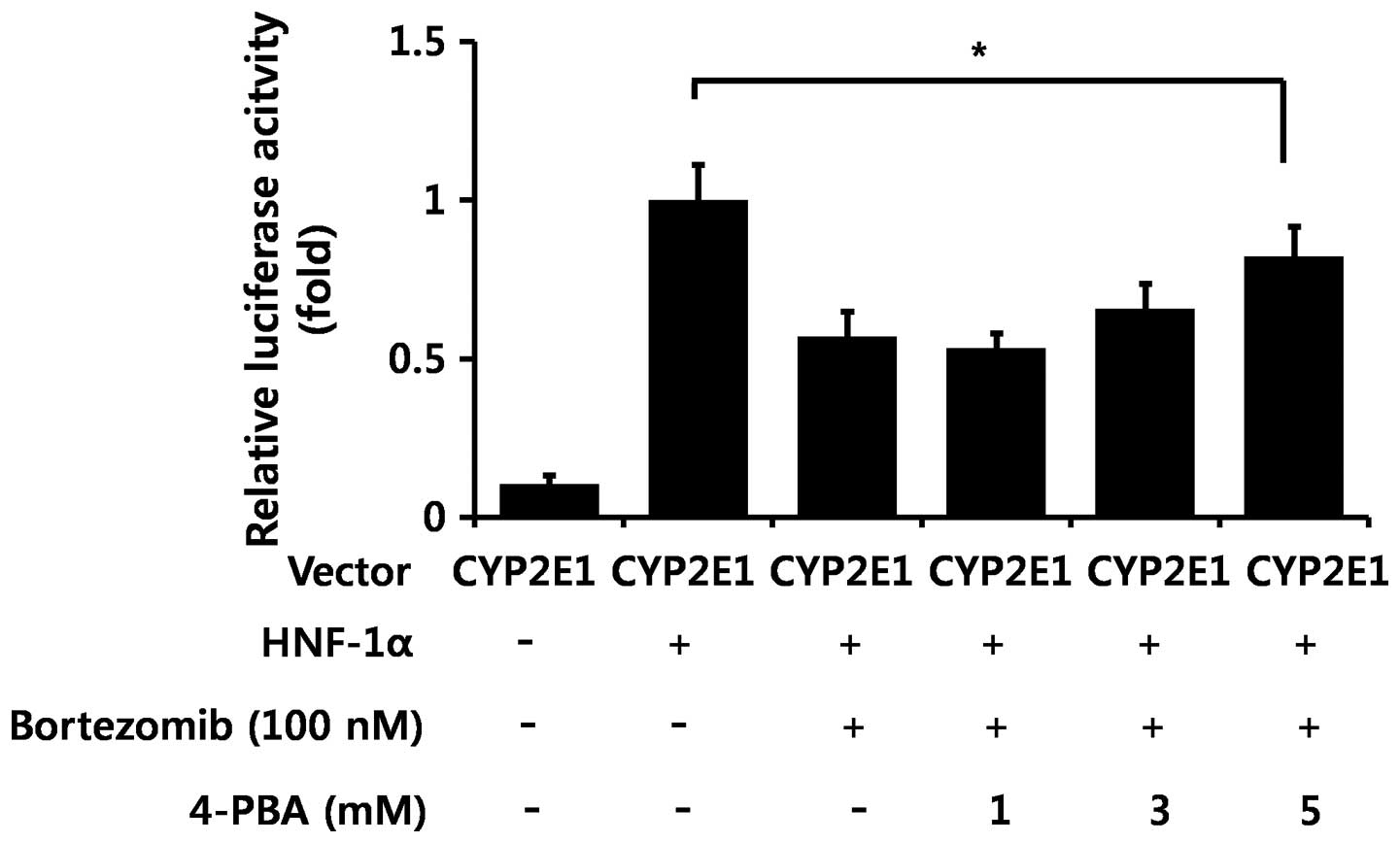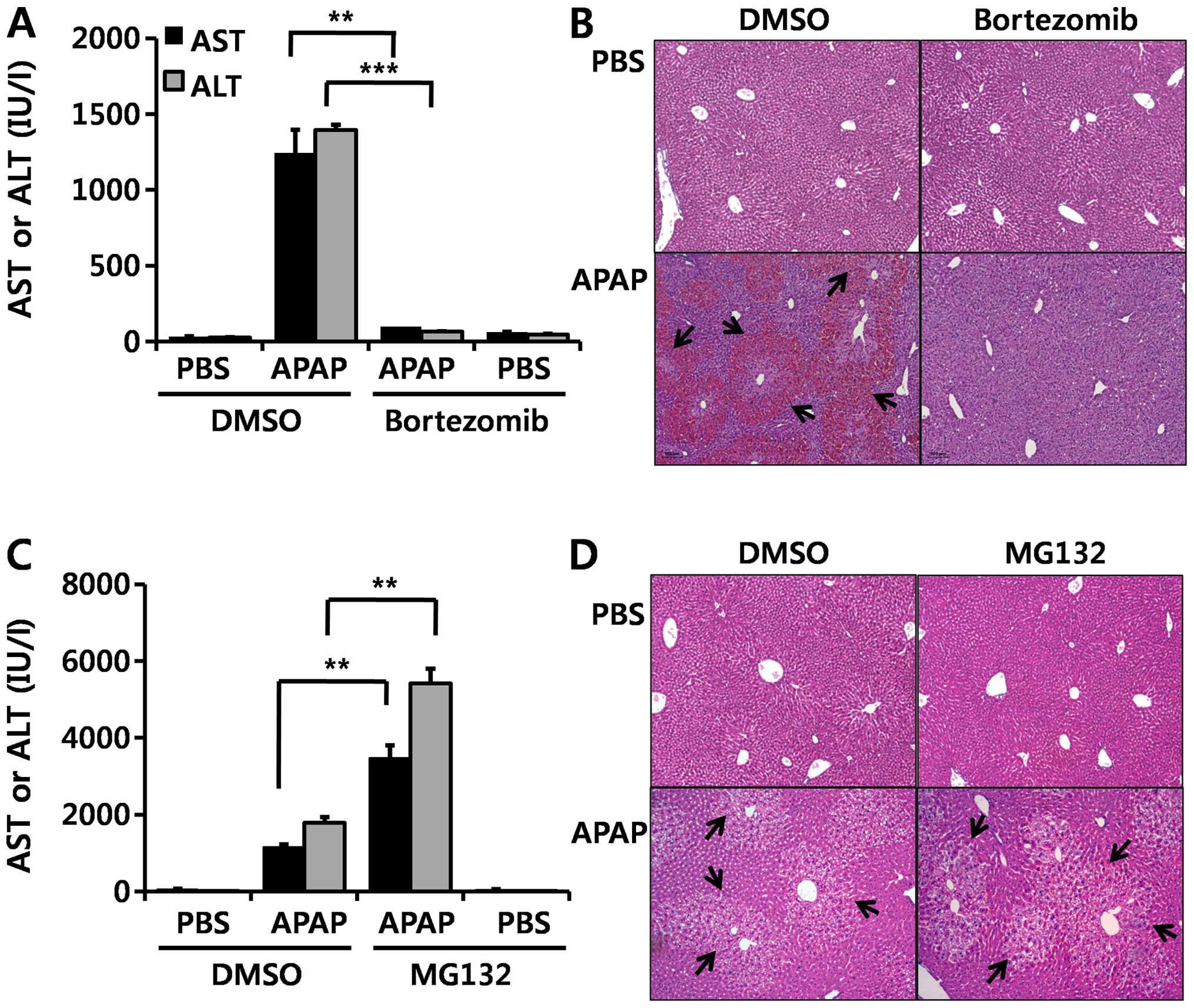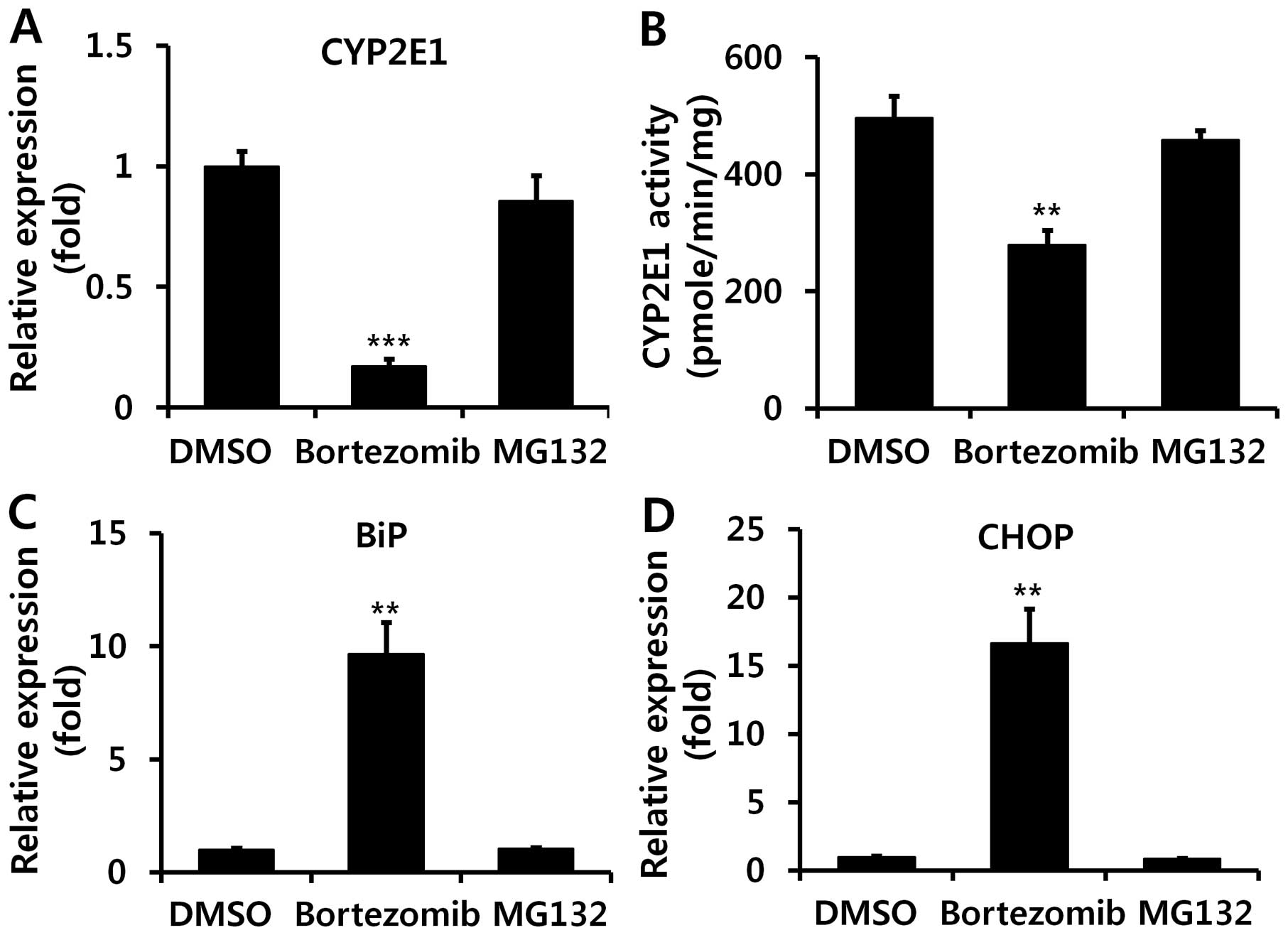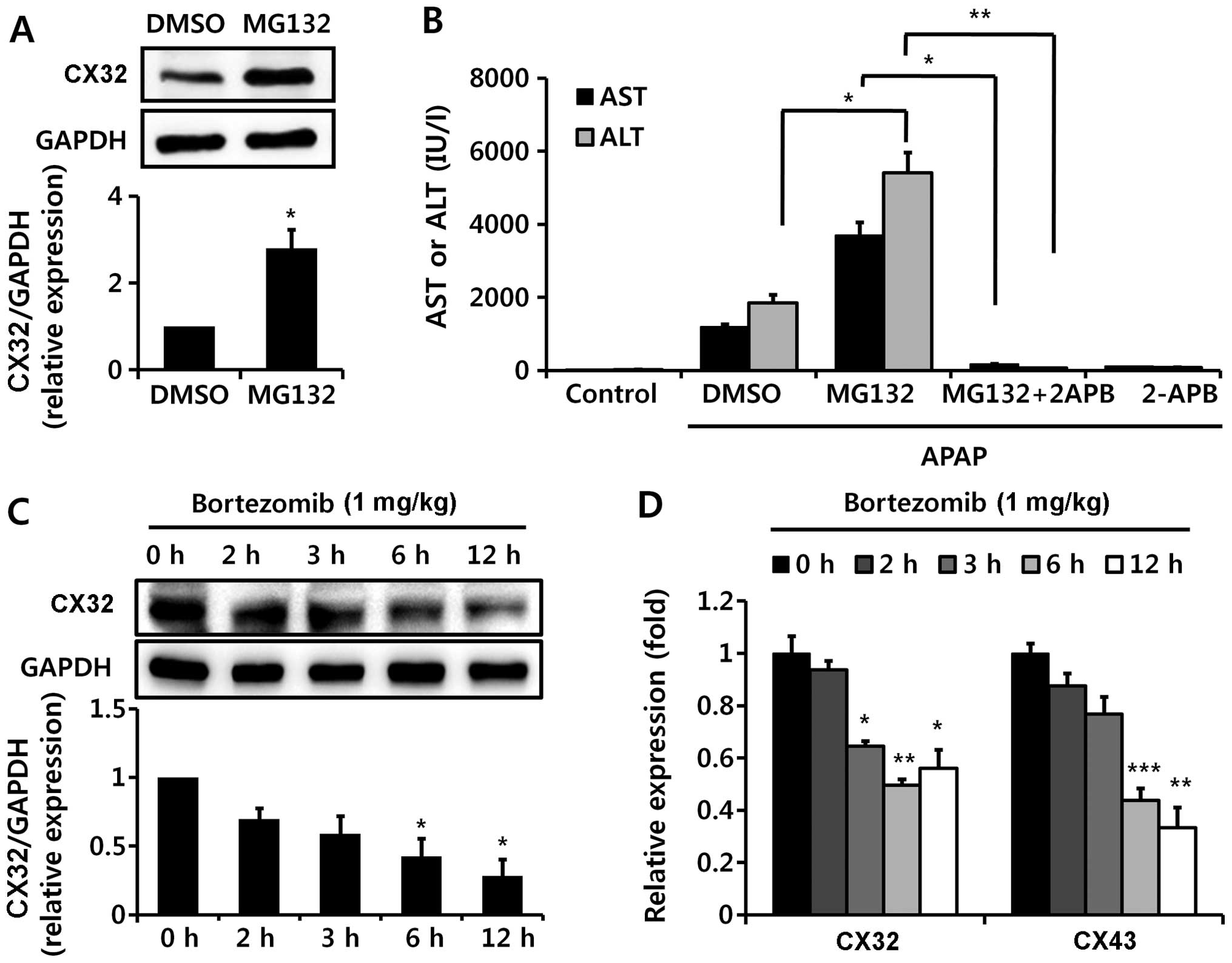|
1
|
Bernal W, Auzinger G, Dhawan A and Wendon
J: Acute liver failure. Lancet. 376:190–201. 2010. View Article : Google Scholar : PubMed/NCBI
|
|
2
|
Hinson JA, Roberts DW and James LP:
Mechanisms of acetaminophen-induced liver necrosis. Handb Exp
Pharmacol. 369–405. 2010. View Article : Google Scholar :
|
|
3
|
James LP, Alonso EM, Hynan LS, Hinson JA,
Davern TJ, Lee WM, Squires RH, Pediatric Acute, Liver Failure and
Study Group: Detection of acetaminophen protein adducts in children
with acute liver failure of indeterminate cause. Pediatrics.
118:e676–e681. 2006. View Article : Google Scholar : PubMed/NCBI
|
|
4
|
Burcham PC and Harman AW: Acetaminophen
toxicity results in site-specific mitochondrial damage in isolated
mouse hepatocytes. J Biol Chem. 266:5049–5054. 1991.PubMed/NCBI
|
|
5
|
Adams J: The proteasome: structure,
function, and role in the cell. Cancer Treat Rev. 29(Suppl 1): 3–9.
2003. View Article : Google Scholar : PubMed/NCBI
|
|
6
|
Richardson PG, Mitsiades C, Hideshima T
and Anderson KC: Bortezomib: proteasome inhibition as an effective
anticancer therapy. Annu Rev Med. 57:33–47. 2006. View Article : Google Scholar : PubMed/NCBI
|
|
7
|
Deming DA, Ninan J, Bailey HH, Kolesar JM,
Eickhoff J, Reid JM, Ames MM, McGovern RM, Alberti D, Marnocha R,
et al: A Phase I study of intermittently dosed vorinostat in
combination with bortezomib in patients with advanced solid tumors.
Invest New Drugs. 32:323–329. 2014. View Article : Google Scholar :
|
|
8
|
Blouin JM, Duchartre Y, Costet P, Lalanne
M, Ged C, Lain A, Millet O, de Verneuil H and Richard E:
Therapeutic potential of proteasome inhibitors in congenital
erythropoietic porphyria. Proc Natl Acad Sci USA. 110:18238–18243.
2013. View Article : Google Scholar : PubMed/NCBI
|
|
9
|
Li Z, Wu Q, Yan Z, Li D, Lu G, Mou W, Wu
S, Pan X, Lu Q and Xu K: The protection and therapy effects of
bortezomib in murine acute graft-versus-host disease. Transplant
Proc. 45:2527–2535. 2013. View Article : Google Scholar : PubMed/NCBI
|
|
10
|
Park WJ, Park JW, Erez-Roman R,
Kogot-Levin A, Bame JR, Tirosh B, Saada A, Merrill AH Jr,
Pewzner-Jung Y and Futerman AH: Protection of a ceramide synthase 2
null mouse from drug-induced liver injury: role of gap junction
dysfunction and connexin 32 mislocalization. J Biol Chem.
288:30904–30916. 2013. View Article : Google Scholar : PubMed/NCBI
|
|
11
|
Wagner-Ballon O, Pisani DF, Gastinne T,
Tulliez M, Chaligné R, Lacout C, Auradé F, Villeval JL, Gonin P,
Vainchenker W and Giraudier S: Proteasome inhibitor bortezomib
impairs both myelofibrosis and osteosclerosis induced by high
thrombopoietin levels in mice. Blood. 110:345–353. 2007. View Article : Google Scholar : PubMed/NCBI
|
|
12
|
Carvalho AN, Marques C, Rodrigues E,
Henderson CJ, Wolf CR, Pereira P and Gama MJ: Ubiquitin-proteasome
system impairment and MPTP-induced oxidative stress in the brain of
C57BL/6 wild-type and GSTP knockout mice. Mol Neurobiol.
47:662–672. 2013. View Article : Google Scholar
|
|
13
|
Sun H, Kosaras B, Klein PM and Jensen FE:
Mammalian target of rapamycin complex 1 activation negatively
regulates Polo-like kinase 2-mediated homeostatic compensation
following neonatal seizures. Proc Natl Acad Sci USA. 110:5199–5204.
2013. View Article : Google Scholar : PubMed/NCBI
|
|
14
|
Oerlemans R, Franke NE, Assaraf YG, Cloos
J, van Zantwijk I, Berkers CR, Scheffer GL, Debipersad K, Vojtekova
K, Lemos C, et al: Molecular basis of bortezomib resistance:
proteasome subunit beta5 (PSMB5) gene mutation and overexpression
of PSMB5 protein. Blood. 112:2489–2499. 2008. View Article : Google Scholar : PubMed/NCBI
|
|
15
|
Markovina S, Callander NS, O'Connor SL,
Kim J, Werndli JE, Raschko M, Leith CP, Kahl BS, Kim K and Miyamoto
S: Bortezomib-resistant nuclear factor-kappaB activity in multiple
myeloma cells. Mol Cancer Res. 6:1356–1364. 2008. View Article : Google Scholar : PubMed/NCBI
|
|
16
|
Park JW, Park ES, Choi EN, Park HY and
Jung SC: Altered brain gene expression profiles associated with the
pathogenesis of phenylketonuria in a mouse model. Clin Chim Acta.
401:90–99. 2009. View Article : Google Scholar
|
|
17
|
Livak KJ and Schmittgen TD: Analysis of
relative gene expression data using real-time quantitative PCR and
the 2(−Delta Delta C(T)) Method. Methods. 25:402–408. 2001.
View Article : Google Scholar
|
|
18
|
Phillips IR and Shephard EA: Cytochrome
P450 Protocols. Humana Press; Totowa, NJ: 2006
|
|
19
|
Reinke LA and Moyer MJ: p-Nitrophenol
hydroxylation. A microsomal oxidation which is highly inducible by
ethanol. Drug Metab Dispos. 13:548–552. 1985.PubMed/NCBI
|
|
20
|
Matsunaga N, Ikeda M, Takiguchi T,
Koyanagi S and Ohdo S: The molecular mechanism regulating 24-hour
rhythm of CYP2E1 expression in the mouse liver. Hepatology.
48:240–251. 2008. View Article : Google Scholar : PubMed/NCBI
|
|
21
|
Park JW, Lee MH, Choi JO, Park HY and Jung
SC: Tissue-specific activation of mitogen-activated protein kinases
for expression of transthyretin by phenylalanine and its
metabolite, phenylpyruvic acid. Exp Mol Med. 42:105–115. 2010.
View Article : Google Scholar :
|
|
22
|
Wong FW, Chan WY and Lee SS: Resistance to
carbon tetrachloride-induced hepatotoxicity in mice which lack
CYP2E1 expression. Toxicol Appl Pharmacol. 153:109–118. 1998.
View Article : Google Scholar
|
|
23
|
Kang JS, Wanibuchi H, Morimura K,
Wongpoomchai R, Chusiri Y, Gonzalez FJ and Fukushima S: Role of
CYP2E1 in thioacetamide-induced mouse hepatotoxicity. Toxicol Appl
Pharmacol. 228:295–300. 2008. View Article : Google Scholar : PubMed/NCBI
|
|
24
|
Lee SS, Buters JT, Pineau T,
Fernandez-Salguero P and Gonzalez FJ: Role of CYP2E1 in the
hepatotoxicity of acetaminophen. J Biol Chem. 271:12063–12067.
1996. View Article : Google Scholar : PubMed/NCBI
|
|
25
|
Patel SJ, Milwid JM, King KR, Bohr S,
Iracheta-Vellve A, Li M, Vitalo A, Parekkadan B, Jindal R and
Yarmush ML: Gap junction inhibition prevents drug-induced liver
toxicity and fulminant hepatic failure. Nat Biotechnol. 30:179–183.
2012. View Article : Google Scholar : PubMed/NCBI
|
|
26
|
Ueno T and Gonzalez FJ: Transcriptional
control of the rat hepatic CYP2E1 gene. Mol Cell Biol.
10:4495–4505. 1990. View Article : Google Scholar : PubMed/NCBI
|
|
27
|
Liu SY and Gonzalez FJ: Role of the
liver-enriched transcription factor HNF-1 alpha in expression of
the CYP2E1 gene. DNA Cell Biol. 14:285–293. 1995. View Article : Google Scholar : PubMed/NCBI
|
|
28
|
Cheung C, Akiyama TE, Kudo G and Gonzalez
FJ: Hepatic expression of cytochrome P450s in hepatocyte nuclear
factor 1-alpha (HNF1alpha)-deficient mice. Biochem Pharmacol.
66:2011–2020. 2003. View Article : Google Scholar : PubMed/NCBI
|
|
29
|
Nawrocki ST, Carew JS, Dunner K Jr, Boise
LH, Chiao PJ, Huang P, Abbruzzese JL and McConkey DJ: Bortezomib
inhibits PKR-like endoplasmic reticulum (ER) kinase and induces
apoptosis via ER stress in human pancreatic cancer cells. Cancer
Res. 65:11510–11519. 2005. View Article : Google Scholar : PubMed/NCBI
|
|
30
|
Armstrong JL, Flockhart R, Veal GJ, Lovat
PE and Redfern CP: Regulation of endoplasmic reticulum
stress-induced cell death by ATF4 in neuroectodermal tumor cells. J
Biol Chem. 285:6091–6100. 2010. View Article : Google Scholar :
|
|
31
|
Hur KY, So JS, Ruda V, Frank-Kamenetsky M,
Fitzgerald K, Koteliansky V, Iwawaki T, Glimcher LH and Lee AH:
IRE1α activation protects mice against acetaminophen-induced
hepatotoxicity. J Exp Med. 209:307–318. 2012. View Article : Google Scholar : PubMed/NCBI
|
|
32
|
Lee AS: The ER chaperone and signaling
regulator GRP78/BiP as a monitor of endoplasmic reticulum stress.
Methods. 35:373–381. 2005. View Article : Google Scholar : PubMed/NCBI
|
|
33
|
Oyadomari S and Mori M: Roles of
CHOP/GADD153 in endoplasmic reticulum stress. Cell Death Differ.
11:381–389. 2004. View Article : Google Scholar
|
|
34
|
Basseri S, Lhoták S, Sharma AM and Austin
RC: The chemical chaperone 4-phenylbutyrate inhibits adipogenesis
by modulating the unfolded protein response. J Lipid Res.
50:2486–2501. 2009. View Article : Google Scholar : PubMed/NCBI
|
|
35
|
Tong X, Dong S, Yu M, Wang Q and Tao L:
Role of heteromeric gap junctions in the cytotoxicity of cisplatin.
Toxicology. 310:53–60. 2013. View Article : Google Scholar : PubMed/NCBI
|
|
36
|
Asamoto M, Hokaiwado N, Murasaki T and
Shirai T: Connexin 32 dominant-negative mutant transgenic rats are
resistant to hepatic damage by chemicals. Hepatology. 40:205–210.
2004. View Article : Google Scholar : PubMed/NCBI
|
|
37
|
Herrmann J, Ciechanover A, Lerman LO and
Lerman A: The ubiquitin-proteasome system in cardiovascular
diseases - a hypothesis extended. Cardiovasc Res. 61:11–21. 2004.
View Article : Google Scholar : PubMed/NCBI
|
|
38
|
Mani A and Gelmann EP: The
ubiquitin-proteasome pathway and its role in cancer. J Clin Oncol.
23:4776–4789. 2005. View Article : Google Scholar : PubMed/NCBI
|
|
39
|
Ciechanover A and Brundin P: The ubiquitin
proteasome system in neurodegenerative diseases: sometimes the
chicken, sometimes the egg. Neuron. 40:427–446. 2003. View Article : Google Scholar : PubMed/NCBI
|
|
40
|
Goasduff T and Cederbaum AI:
NADPH-dependent microsomal electron transfer increases degradation
of CYP2E1 by the proteasome complex: role of reactive oxygen
species. Arch Biochem Biophys. 370:258–270. 1999. View Article : Google Scholar : PubMed/NCBI
|
|
41
|
Roberts BJ: Evidence of
proteasome-mediated cytochrome P-450 degradation. J Biol Chem.
272:9771–9778. 1997.PubMed/NCBI
|
|
42
|
Park HS, Jun Y, Han CR, Woo HJ and Kim YH:
Proteasome inhibitor MG132-induced apoptosis via ER stress-mediated
apoptotic pathway and its potentiation by protein tyrosine kinase
p56lck in human Jurkat T cells. Biochem Pharmacol. 82:1110–1125.
2011. View Article : Google Scholar : PubMed/NCBI
|
|
43
|
Levêque D, Carvalho MC and Maloisel F:
Review. Clinical pharmacokinetics of bortezomib. In Vivo.
21:273–278. 2007.PubMed/NCBI
|
|
44
|
Pérez MJ and Cederbaum AI: Proteasome
inhibition potentiates CYP2E1-mediated toxicity in HepG2 cells.
Hepatology. 37:1395–1404. 2003. View Article : Google Scholar : PubMed/NCBI
|
|
45
|
Fernandes R, Girão H and Pereira P: High
glucose down-regulates intercellular communication in retinal
endothelial cells by enhancing degradation of connexin 43 by a
proteasome-dependent mechanism. J Biol Chem. 279:27219–27224. 2004.
View Article : Google Scholar : PubMed/NCBI
|
|
46
|
Minogue PJ, Beyer EC and Berthoud VM: A
connexin50 mutant, CX50fs, that causes cataracts is unstable, but
is rescued by a proteasomal inhibitor. J Biol Chem.
288:20427–20434. 2013. View Article : Google Scholar : PubMed/NCBI
|
|
47
|
Laing JG, Tadros PN, Westphale EM and
Beyer EC: Degradation of connexin43 gap junctions involves both the
proteasome and the lysosome. Exp Cell Res. 236:482–492. 1997.
View Article : Google Scholar : PubMed/NCBI
|
|
48
|
Huang T, Wan Y, Zhu Y, Fang X, Hiramatsu
N, Hayakawa K, Paton AW, Paton JC, Kitamura M and Yao J:
Downregulation of gap junction expression and function by
endoplasmic reticulum stress. J Cell Biochem. 107:973–983. 2009.
View Article : Google Scholar : PubMed/NCBI
|
|
49
|
Larson AM: Acetaminophen hepatotoxicity.
Clin Liver Dis. 11:525–548. vi2007. View Article : Google Scholar : PubMed/NCBI
|
|
50
|
Farfel-Becker T, Vitner E, Dekel H, Leshem
N, Enquist IB, Karlsson S and Futerman AH: No evidence for
activation of the unfolded protein response in neuronopathic models
of Gaucher disease. Hum Mol Genet. 18:1482–1488. 2009. View Article : Google Scholar : PubMed/NCBI
|
|
51
|
Hetz C, Lee AH, Gonzalez-Romero D, Thielen
P, Castilla J, Soto C and Glimcher LH: Unfolded protein response
transcription factor XBP-1 does not influence prion replication or
pathogenesis. Proc Natl Acad Sci USA. 105:757–762. 2008. View Article : Google Scholar : PubMed/NCBI
|















